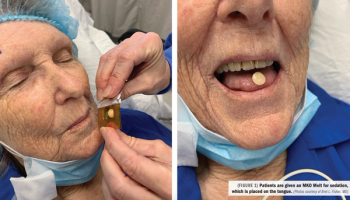
Alcon pulls lubricant drops after mold found
Fort Worth, TX-The presence of mold in multiple bottles of Systane Free Liquid Gel has forced Alcon Laboratories Inc. to issue a voluntary recall of the product.
Fort Worth, TX-The presence of mold in multiple bottles of Systane Free Liquid Gel has forced Alcon Laboratories Inc. to issue a voluntary recall of the product.
The company voluntarily initiated the recall of the lubricant eye drops after 11 consumers reported finding a foreign material in the drops, which are sold over the counter to treat dry eye.
The product, which was launched in January 2006, was manufactured in the United States and distributed throughout the country, including Puerto Rico. More than 5 million bottles of the gel have been distributed since it was introduced. It was promoted as an artificial tear product that offered the benefits of a gel, but caused less blurring.
The original Systane lubricant eye drops and Systane unit doses are not part of this recall and can continue to be used safely, according to Alcon.
Once the company received the reports, it began to investigate returned product and samples from the two lots in which the mold had been reported, said Doug MacHatton, Alcon’s vice president of investor relations.
After what MacHatton calls a “comprehensive review” of its manufacturing records, the company determined that the presence of mold was caused by a problem with the formulation of Systane Free Liquid Gel and was not a manufacturing problem.
No injuries have been associated with these reports, and only certain types of mold are rarely associated with eye infections.
“Even though a resulting infection is unlikely and we have not received any reports of fungal infections associated with this voluntary recall, we took this immediate action to demonstrate our commitment to providing products that meet the highest standards of quality,” MacHatton said.
No commonalities were found among the 11 reports Alcon received, he said.
Microbial contaminants
Alcon Laboratories’ researchers believe the preservative system specific to the Systane Free Liquid Gel was not able to prevent microbial contamination in a small number of cases.
“Alcon’s research and development group believes it is possible that the amino-methylpropanol specific to the Systane Free Liquid Gel formulation has served as a source of nitrogen” necessary for the growth of microbial contaminants that may come into contact with the product during routine use, MacHatton said.
Consumers, retailers, and eye-care professionals with the bottles should discontinue use and call 866/608-3936 or visit www.systane.com for instructions. The company also is contacting retailers, distributors, and eye-care professionals to obtain the products and offer replacement products.
The company is replacing purchased bottles of the Systane Free Liquid Gel with a 15-ml bottle of its original formulation of Systane eye drops, which is based on a different preservative system from Systane Free eye drops and has been used safely since 2003.
“Alcon is absolutely committed to providing the highest level of quality eye-care products,” said Kevin Buehler, Alcon’s senior vice president, United States, and chief marketing officer, in a prepared statement. He was unavailable for an interview.
Although the company did not say how many bottles it believes could be in consumer hands, it expects that the recall will cost the company $8 million to $10 million (pre-tax).
Sales of the recalled product account for less than 10% of Alcon’s sales of artificial tears in the United States and Puerto Rico, and less than 0.2 of 1% of Alcon’s total global sales. The company does not anticipate that the removal of the product from production lines will have a material impact on its projected sales or profits in 2007.OT
Newsletter
Don’t miss out—get Ophthalmology Times updates on the latest clinical advancements and expert interviews, straight to your inbox.





























